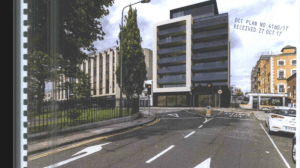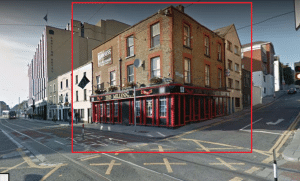Happy Christmas from Villager!
No Trump lookalikes or Nominal determinisms this month. Villager’s had it with formula journalism. In fact he’s had it with a lot of things. Nothing ever changes: Fianna Fáil, Fine Gael, one-off-housing and winter never went away. The only good thing is we see less of Martin Mansergh, now. And Christmas, well we’re writing for the January market too since the finances and staffing are so threadbare we can’t come out every month. so the editor’s told Villager not to emphasise Yule. Whatever the spirit of Christmas is Village is the opposite of it, Villager reflected. The only concession anyone remembers to the season of goodwill in this magazine was a sprig of photographic holly between the bar code and Frank Connolly. In 2009.
New
So, the Oireachtas committee on the Eighth Amendment has agreed to recommend a series of changes to abortion laws, including access to terminations without restriction, up to 12 weeks. That, Villager has to accept, is new.
As is Sinn Féin’s new found queasiness about being the most radical gang in town.
Sinn Féin abstained on the vote as it goes beyond the party’s position on the Eighth Amendment.
However, the party’s health spokeswoman Louise O’Reilly said it would review its position on this matter, in light of the committee’s recommendations. Where stands transcendent feminism in the mix?
McCabes
The leadership of Sinn Féin has demonstrated a cynical indifference towards Garda McCabe. Its collective silence about the injustice meted out to him is deafening.
Villager is talking about the other Garda McCabe; the skeleton in SF/IRA’s bloodstained cupboard, the murdered Detective Jerry McCabe who was gunned down by the Provisional IRA at Adare in June 1996 during a Republican fundraising event (i.e. an armed heist).
Back in 1996 SF told all sorts of lies about the killing. It took Gerry Adams until 2013 to make an apology in the Dáil.
Mary Lou McDonald aspires to becoming SF Leader and, no doubt Tánaiste, in the future. We know what she thinks about Garda Maurice McCabe. She admonished the recently retired Tánaiste Frances FitzGerald about his case thus: “You may think, Tánaiste, that you’ll weather this storm, that you ride it out, but you won’t, because the terrible vista of a conspiracy to malign a good man, to smear him as a sex abuser in order to shut him up, is not some minor political episode that can simply be brushed away”.
Fine words but what pray has our putative SF Tánaiste ever had to say about the murder of Jerry McCabe? The murder of a Garda officer is “not some minor political episode”.
She might also care to answer the following question for Villager: “Have you or anyone on your behalf, either directly or indirectly, had any form of communication with anyone involved with the Provisional IRA, concerning SF leadership issues during the last three years? In other words: Have you obtained the Army Council’s blessing for your forthcoming leadership coronation?”.
Boulted-on to Disney
Disney has bought much of Rupert Murdoch’s media empire including Sky UK and Adam Boulton with it. Villager didn’t mind Boulton referring to “You Irish” as being too sensitive about the Brexit negotiations. Partly because we are but also because there was a time when it would have been “The Irish” as an introduction to something patronising.
Of course we’ve little enough to be patronised about these days (apart from our trashy party politics). Britain, or more precisely England, meanwhile has managed to throw away a Millennium-old reputation for sober and empirical, evidence-based stoicism in the eighteen months since it wrapped up all its understanding of history and economics, wrapped it up in a Union Jack and tossed it into the cross winds over Beachy Head. Now that’s something to get patronised about.
Boosting home Eoghanership
The Department of Housing is to exempt a number of developments from planning permissions to help tackle the housing crisis.
Under new regulations – which will need to be passed by theOireachtas – the redevelopment of so-called “over the shop” units will be allowed without planning permission. It seems a sensible measure. Nothing else has worked in thirty years and our towns, cities and villages are characterised by lack of energy overhead. Still they’ll need to ensure that Building Regulations on issues like sewerage and noise are somehow addressed, and that historic features like staircases aren’t casually jettisoned.
Dense
Further development of a new town by Gannon Homes at Clongriffin in north Dublin is to proceed following the granting of planning permission for a landmark 16-storey 139-apartment building on the edge of the town’s’ Station’ square.

Clongriffin has been designed as a new town with a main street and 3,600 residential units once complete. Its development stalled with the downturn. High-rise there will add visual interest, and high-density is justified as the DART stops beside it; just stay cautious about imposing it on the unyielding centres of our cities and towns where, particularly in Dublin, it threatens the unique selling point of the city, its historic human scale.
Dense
Dublin hoteliers continue to take casual injunctions of high-density from Leo Varadkar and his mate at the Department of Justice, Eoghan Murphy, as a charter. Rumour has it the Ormond Hotel which adjoins the Village office on Ormond Quay Upper is looking to increase the density allowed by An Bord Pleanála in its decision earlier this year.
And the horrible Ashling hotel near Heuston wants to become horribler still, and demolish some of its historic neighbours.

The freeholders of the Leprechaun Museum (with a Ben Dunne gym overhead) on the Upper Abbey St/Jervis St corner in central Dublin too want to demolish an unusual and potentially attractive former corset factory, the Twilfit building, and replace it with a behemoth that would overshadow the concreted space that passes as Wolfe Tone Park.
Amnesty for Amnesty?
The Standards in Public Office commission (SIPO) has instructed Amnesty International to return a €137,000 donation from the Soros-funded Open Society Foundation, for breaches of the Electoral Act. The donation funded the ‘My Body My Rights’ campaign, which advocates the repeal of the Eighth Amendment and the introduction of laws providing for abortion in Ireland.
Refusing to obey, Amnesty’s formidable chief executive, Colm O’Gorman, told the Sean Ó Rourke show, “We believe in the rule of law absolutely and we believe that this decision by SIPO is deeply flawed on a number of levels. First of all, we think the principle upon which they have approached the law is deeply flawed and likely illegal if not under Irish law at least under international law”.

The purpose of these prohibitions is to protect against interference by foreign individuals or entities in Ireland’s domestic political processes. There should be no special pleading, especially from organisations whose agenda is propriety. Prohibited donations must be refused or returned.
A pointed press release from SIPO noted that: “In 2016, the Commission received information that several Irish organisations had received donations from a foreign donor. At the time, the Commission made inquiries and received assurances from the recipients that the donations were not for political purposes. However, the Commission recently received new information that indicated the donations were indeed for political purposes. The Commission sought and received written confirmation from the donor that the funding was for explicitly political purposes. As it is the intent of the donor that determines whether a donation is a political donation, the funding very clearly fell within the Act’s prohibitions. The Commission has issued directives to the recipients to return the prohibited donations. In so doing, the Commission has administered the Act as enacted by the Oireachtas. The Commission rejects any assertion that its actions are out of keeping with the provisions or intent of the Act, or that it has acted inconsistently. The Commission has not changed its approach to implementing the provisions of the Act”.
Under the legislation, a sentence of up to three years can be imposed for breaches. From the sound of it, Amnesty, one of the best campaigning organisation’s around, but one whose focus tends to be on ‘freedom’ rather than true ‘equality’; on civil and political not social and economic rights, or its protagonists, would deserve it.
Sue Denham
Whatever about the begrudgers, who say she was a little too concerned to support the indefensible privileges of the judiciary there is unanimity in legal circles that Susan Denham was an exemplary Chief Justice: nothing short of a ‘national treasure’ according to many of our magnificently-upholstered friends in the Four Courts who would have her installed in the Park in short order. A superb painting of her by William A Nathans already graces the walls of the King’s Inns.
Originally appointed to the Supreme Court in 1992, Enda Kenny elevated her to the top post in July 2011. Not only was she the first woman to grace that post, she was also the first non-Catholic. She spawned the best judicial pun of all time: she was Sue Denham but that was only a pseudonym.
Her departure, however, has highlighted what is beginning to look dangerously like the demise of a venerable legal tradition: the appointment of talented Protestants to the bench.

True, a highly regarded and qualified barrister who just happens to be Quaker was appointed in recent years, but Quakers and Protestants are not the same thing.
Shane Ross, a Cabinet minister who has displayed an avid interest in the appointment of beaks, and is a member of the Protestant faith himself, does not seem much troubled by the Catholic (and lapsed-Catholic) domination of the courts at virtually all levels from District to Supreme.
The Bar itself has no hang ups: in the last few weeks, David Trimble, First Minister of NI, 1998- 2002, and a former law lecturer, was made an Honorary Bencher of the Honorable Society of King’s Inns, an honour, in case you were in doubt, despite the spelling.
Operatic Errors in Limerick
There is some anger in Limerick that the now beloved, or at least euphonious, €150m Project Opera plan which would soar over Georgian Limerick at Newtown Pery, has been taken out of the hands of councillors. A submission by An Taisce showed that the 1.8 hectare scheme required an EIA even though the threshold for EIA in urban settings is 2.2 hectares. That is because schemes that may have a significant effect on the environment because, “inter alia, of their nature, size or location” require EIA even if they are sub-threshold. The Opera site is the most important, and historic, site in Limerick. Though the City and County Manager, Conn Murray, put a brave face on it, claiming the EIA was optional, it was required, by the law.
Under Irish and EU law, a local authority cannot apply to itself for permission where an EIA is required. The application must be made to An Bord Pleanála in Dublin, depriving Councillors of any role. So it’s back to the drawing board for Limerick City and County Council. The Manager claims the delay will only be of a month or two, but compiling an EIS takes up to six months.
The move has been described by homelessness charity Novas as “unfortunate”, saying it fears the views of a cross-party lobby of members wanting housing in Project Opera will now not be considered.
Former Limerick mayor Kieran O’Hanlon said: “I’d have an issue of an erosion of local democracy. Councillors have been taken out of the formula in a lot of areas in terms of local government. I can understand big projects are unnecessarily delayed by spurious objections, but this is a major development, and I think councillors should have an input”.

Sometimes the quality of debate in Limerick is Neanderthal: The Limerick Leader reported Independent councillor John Gilligan believed no housing should go into Opera, saying it would be “tokenism at best” and noting that other office developments, like the National Technology Park in Plassey do not have housing included.
A recent edition of RTÉ’s ‘Nationwide’ on this destructive scheme featured a lot of nodding from Mary Kennedy, and David Conway, CEO of Limerick 2030, offering the unexplained opinion that you couldn’t have everything – by which he meant housing – on the site.
Essential Hickey
If Pat Hickey can remain on the committee of the Olympic Council of Ireland literally anyone can remain on anything. The UK should inject itself with essence of Pat Hickey. #Remain.
Dangerous
Another man was shot by Gardaí in December, and our media are still not questioning the dubious accounts offered by the Gardaì. Why don’t our armed police wear bodycams? They are going to kill someone, soon.
Roads to Nowhere
The Planning Appeals Commission has given the go-ahead for the North’s largest-ever road project, the A5 dual carriageway from Newbuildings, south of Derry, to a roundabout west of Ballygawley, County Tyrone. The Department of Infrastructure made the announcement on November 27. This only gives objectors until January 5 to initiate a legal challenge, obviously hampered by the Christmas holidays.
The Irish government is contributing £75million (€85.3million) to the project. The Environmental Protection Agency says Ireland will not meet its target for reducing greenhouse gas emissions – with transport emissions the most difficult to control.
Doing Donegal
Jerry Beades, the head of the ‘New Land League’ once said the Killiney mansion of the pampered O’Donnell family home at the centre of a legal dispute was a “bog standard, simplistic” house. To which a laughing Vincent Browne replied, “You’re ridiculous”, before asking him to “please stop talking” and to “shut up”. Beades has now sent a letter to Leo Varadkar alleging that former Minister Paddy Donegan, infamous for calling Cearbhall O’Dálaigh a thundering disgrace so leading to his resignation, was a paedophile and claiming that Peter Kelly was formerly the boyfriend of a judge who recently resigned. In 2000 Judge Kelly struck out proceedings brought by Donegan, who was seeking an order restraining the DPP from further proceeding with the criminal prosecution, which was due to be heard in the Circuit Criminal Court. The DPP had decided not to proceed with the prosecution on 70 charges of indecent assault of five children following expert medical advice that Donegan was unfit to stand trial due to his age and illness, the High Court.

The complainants were understood to be adults who claimed they were abused by the man when they were children. Some of the allegations dated back more than 30 years and are alleged to have occurred in a school. Donegan claimed it was unfair to continue the proceedings having regard to delay in making complaints, his age, the availability of witnesses and material evidence, the generalised nature of the allegations and previous adverse media publicity. In March 2000 Paddy MacEntee SC told Judge Kelly the State had accepted there was no issue to be determined and the prosecution would not be pursued. An affidavit on behalf of the DPP stated that, in the light of a psychologist’s report, the DPP had decided the former politician was not in a position to stand trial due to his deteriorating mental condition. Beades has been pursuing a vendetta against Peter Kelly. In 2016 Judge Robert Haughton granted a preliminary application by the State to dismiss Beades’ case challenging the Government’s decision to nominate Kelly as President of the High Court as bound to fail; disclosing no reasonable cause of action; frivolous and vexatious and/or an abuse of process. Judge Haughton said a finding of improper purpose was borne out by Beades’ attempts to “read into the record” his allegations of unsuitability against Judge Kelly, which were “no more than allegations”, and by Beades’ statement that he had alerted the press to his case. In the Commercial Court in 2010, Peter Kelly ruled a receiver appointed by ACC Bank was entitled to orders for possession of certain premises in Richmond Road, Fairview, Dublin, against Fairlee Properties Ltd over non-payment of a €1.5m debt. Beades was a director of Fairlee and asked for a stay on the order, but the judge again told him he had no entitlement to appear on behalf of Fairlee. “You owe €1.5m to the bank and that is the reality of the situation and the sooner you face up to that the better”, the highly- judge told him. Apparently he still hasn’t.
Bankster
US media are reporting that Wilbur Ross, Trump’s Commerce Secretary, is in trouble for insider trading. A report commissioned by MEP Luke Ming Flanagan for the European Parliament, which got little traction in Ireland, alleges Ross got insider access to the accounts of Bank of Ireland which showed they were using pre-bust valuations of properties to inflate their loan book. He then sold the shares – at a half-billion euro profit – before this became public.



